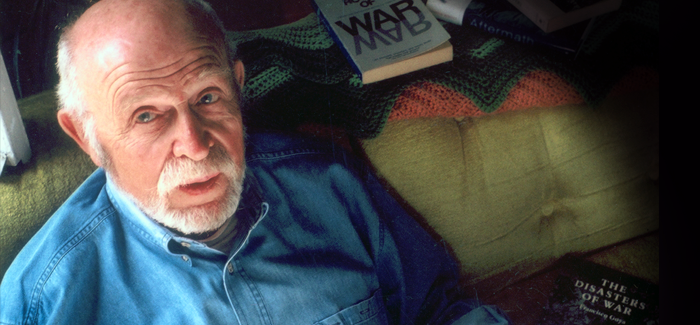
(Photography by Lori Grinker, courtesy Edward W. Wood Jr., PhB’47)
A new Great Books anthology tries to get veterans talking.
After a lifetime of struggling to understand war, I now am sure that every person in serious combat, under the terrible pressure of that pitiless place, does something for which they are always ashamed. For me, it was the simple act of being wounded after but four days in my Division and one day at the front. What kind of man was I not to have lasted any longer?
—Edward W. Wood Jr., PhB’47, “Revisiting My Memoir: On Being Wounded,” War, Literature and the Arts: An International Journal of the Humanities, Fall/Winter 1999
The small stage at the Pritzker Military Library contains four chairs.
One is for the discussion moderator, Don Whitfield, director of the Great Books Foundation and editor of its new anthology, Standing Down: From Warrior to Civilian.
Two of the chairs are for youngish men, both veterans of the Iraq War: Ed Hrivnak, author of Wounded: A Legacy of Operation Iraqi Freedom (2013), and Benjamin Busch, author of Dust to Dust (2012) as well as an actor who has appeared on The Wire.
And one, the chair closest to the moderator, is for Edward W. Wood Jr., PhB’47, who was wounded in World War II and didn’t write about it until 40 years had passed. In 1991, Wood published a memoir, On Being Wounded. Since then, he has written Beyond the Weapons of Our Fathers (2003) and Worshipping the Myths of World War II: Reflections on America’s Dedication to War (2006).
There are no empty chairs in the small auditorium; the balcony is filled too.
Standing Down, which was created for Talking Service, a new Great Books reading and discussion program for veterans, begins with an excerpt from the Iliad. The anthology includes writings by the usual Great Books suspects—Thucydides, Shakespeare, Tocqueville, Tennyson, Whitman, Tolstoy, Freud, Hemingway—as well as Margaret Atwood, Tobias Wolff, Tim O’Brien, and the three authors on the Pritzker stage for its national launch in December.
Whitfield’s first question is about the importance of storytelling: “We hear again and again that veterans need to tell their stories,” he says, “and they need to hear stories from others who have experienced military life, and especially combat, firsthand.”
The best time to tell a story is in the moment, says Busch. "There’s a certain immediacy to the first truth of an experience. If the truth is out right away, it’s already true. It’s already losing some of its power to come after you.”
“I think that’s partly generational,” says Wood: Veterans who served in World War II “weren’t allowed to talk about it." Although he was under the care of a psychiatrist for several years, “the war was never mentioned as part of my emotional problems,” he says. "It was Mama, Daddy, and me and Freud. We were all in bed together.” Wood’s soft voice is momentarily drowned out by laughter from the audience.
At age 59, Wood continues, he returned to the area of eastern France where he had been wounded at age 19. “When I came back, my life changed. It just changed. I started to write, which I always wanted to,” he says. Raised in the South, with ancestors who had fought in every American conflict beginning with the French and Indian War of 1756, Wood felt like a failure for being wounded so soon. “If you tell the wrong story, you destroy yourself,” he says. “And if you get hold of the right one, you become a different human being. I saw what I really did. I was a very brave kid. And it just changed me."
The discussion shifts to the transition back to civilian life, which both Busch and Hrivnak found difficult. “War is much easier than home,” says Hrivnak, whose wife, also in the military, was deployed after he returned. “I found being home far more challenging—normal routine life. And we didn’t have kids at the time. I could not imagine staying home with the kids and Jennifer leaving.”
Later, talking about the universality of wartime experience, Whitfield tells a story about Sidney Hyman, AB’36, AM’38, senior fellow at the Great Books Foundation (to whom the book is dedicated). While serving in the Italian campaign of World War II, Hyman met three journalists. He had been sent three books—Thucydides’s History of the Peloponnesian War, War and Peace, and the Iliad—and he handed one to each journalist, saying, “It’s all the same. Just update it.”
“I’m 88 years old," says Wood, and yet he can still remember “the smell of blood. The smell of my blood, the smell of blood dripping on me from the stretcher above.” Busch and Hrivnak both nod. “A sweet-sick smell.”
With that stomach-turning observation, the discussion, which is being taped for WYCC public television, is out of time. “We have to thank all the writers who are in the book who couldn’t be with us tonight,” Whitfield says.
“Thank Homer,” Wood interjects. The audience, in spite of themselves, is laughing again.
A recording of the Standing Down discussion will air on WYCC (PBS Chicago, channel 20), on Sunday, January 19, 2014, at 11 a.m. and Sunday, January 26, at 5 a.m.
